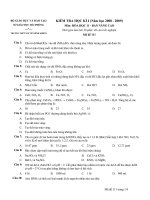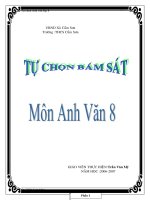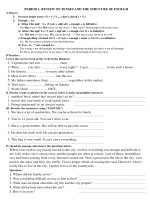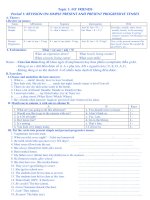Tu chon AV8 HKI NANG CAO 08.doc
Bạn đang xem bản rút gọn của tài liệu. Xem và tải ngay bản đầy đủ của tài liệu tại đây (466.22 KB, 10 trang )
PERIOD 1: REVIEW ON TENSES AND THE STRUCURE OF ENOUGH
A Theory:
1. Present simple tense: (S + V
1
/ V
-s/es
/ don’t, doesn’t + V
1
)
2. Enough .. .to:
a) Đồng Chủ ngữ: S + (V not) + adj/ adv + enough + to Infinitive.
Ex: She wasn’t old. She wasn’t in my class → She wasn’t old enough to be in my class.
b) Khác chủ ngữ: S +( V not) + adj/ adv + enough+ for O + to Infinitive.
Ex: The test is very easy. We can do it well. → The test is easy for us to do well.
c) Enough dùng với danh từ: S + (V not) + enough + noun (+ for O) + to Infinitive.
Ex: He has money enough to buy that big house.
d) Too... to
→
not…enough to:
Too young = not old enough; too boring = not interesting enough; too short = not tall enough
Ex: He is too young to be in my class. = He is not old enough to be in my class.
B Practice:
I. Give the correct form of the verbs in the blankets:
1. Vegetarians (not eat) ……………………………………… meat.
2. What………………… you (do) ……………………………………… every night? – I (go) ………………………………………to my aunt’s house.
3. He (listen) ……………………………………… to music after school.
4. Most rivers (flow) ……………………………………… into the sea.
5. My father sometimes (buy) ……………………………………… vegetables at this market.
6. They (go) ……………………………………… fishing on Sunday.
7. Water (boil) ………………………………….....… 100
0
C.
II. Put the words or phrases in the correct order to make meaningful sentences:
1. marbles/ boys/ often/ the/ recess/ play/ at/ do? ........................................................................................................................
2. never/ my/ can/ meal/ a/ cook/ good/ sister. ........................................................................................................................
3. Phong/ interested/ is/ in/ always/ music. ........................................................................................................................
III. Rewrite the sentences, using “ENOUGH”:
1. We have a lot of sandwiches. We can have them for lunch.
.............................................................................................................................................................
2. You’re 14 years old. You can’t drive a car.
.............................................................................................................................................................
3. She is a good student. She will be able to pass this exam.
.............................................................................................................................................................
4. He does his work well. He can get promotion.
.............................................................................................................................................................
5. This bag is very small. It can’t carry everything.
.............................................................................................................................................................
IV. Read the passage and answer the questions below:
When I was twelve, my family moved to the city. At first, everything was strange and difficult to
me. Life in the city is always busy and the people are often in a hurry. Lots of bikes, motorbikes,
cars and buses coming from every direction scared me. Now I get used to the life in the city. I am
used to the noise and busy city traffic. I’m no longer afraid of crossing the road. However, I don’t
really like to live in the city. I prefer to live in the countryside.
Questions:
1. Where did his family move? ................................................................................................................................
2. Was everything difficult or easy to him at first? .................................................................................................................................
3. What does he think about the city life and the city people? .....................................................................................................
4. What did he hate most about the city? .................................................................................................................................
5. How is he now? .................................................................................................................................
6. Does he live in the cities? .................................................................................................................................
PERIOD 2: REVIEW ON TENSES AND - SUGGESTIONS
A Theory:
1. Simple past tense ( S+V
2/
V-ed / didn’t V
1
)
2. The suggestions: (Lôøi ñeà nghò)
Would you like + to- V.. ? What about + V-ing...? Shall we/ Why don’t you +V
1
…? Let’s +V
1
…
Would you like to play chess?
- I’d love to
What about playing chess?
– OK.
Why don’t you relax?
- Good idea.
Let’s go swimming
.- Great.
B Practice:
I. Match the sentences in column A with the ones in column B:
A B Keys
1. Shall we go out for dinner tonight?
2. Is 8.am OK?
a. That’s very kind of you.
b. Why don’t you listen to music?
1 -
2 -
3 -
4 -
5 -
6 -
7 -
8 -
II. Give the correct form of the verbs in the blankets:
1. My father (listen) ………………………………… to the radio last night.
2. Mr. Tan (not go) ………………………………… to work yesterday.
3. Mr. Nam (not work) …………………………………………… last Sunday.
4. My mother (arrive) ………………………………… home 3 day ago.
5. The students (not, be) …………………………………………… in class when I came.
6. She (stay) ………………………………… at home and did nothing.
7. ……………… you (watch) ………………………………… a soccer match on TV last night?.
8. Look! Mr. Nam (talk) …………………………………………… to Ba. He (teach) ………………………………… math at this school in 1986.
III. Complete the dialogue between you and Lan:
Lan: Would you like to go to the movie with me?
You:................................................................................................................................
Lan: What a pity! How about tomorrow night?
You:................................................................................................................................
Lan: Is 6:00 OK? The film starts at 7:00.
You:................................................................................................................................
Lan: I’ll pick you up. See you tomorrow.
You:................................................................................................................................
IV. Read the passage and answer the following questions:
We moved into our new house on a warm September day. It was not really a new house. It was a
hundred and four years old, but it was new to us. The house had running water, gas and electricity but
for some reasons, there was no electricity light in the kitchen. It was some thing quite unexpected: a
house with electricity but without a kitchen light. It was quite puzzling because our kitchen was a large
room, perhaps the largest in the house.
1. When did they move into their new house? ...........................................................................................................................................
2. Was the house new or old? ...........................................................................................................................................
3. Was the house more than a century old? ...........................................................................................................................................
4. Was there no electricity in the house? ...........................................................................................................................................
5. Why did the writer feel puzzled? ...........................................................................................................................................
PERIOD 3: REVIEW ON TENSES AND MODALS
A Theory:
1. Future simple tense (S +will + V
1
)
2. Intended future: (S+ am / is / are + going to
+
V
1
)
3. Modals: must - have to - ought to - used to
Must (phải) Have to (phải) Should / Ought to (phải nên) Used to (đã từng)
Diễn tả sự cần thiết có
tính chủ quan, bắt
buộc, tính qui luật, Sự
phỏng đoán chắc chắn
Diễn tả sự bắt buộc do tình
huống từ bên ngoài.
Diễn tả việc thực hiện lời
khuyên, bổn phận hay trách
nhiệm nhưng không chắc
được thưc hiện hay không.
Diễn tả 1 thói quen ở
quá khứ nhưng nay không
còn nữa.
I must take some pills
from the doctor.
I have to go to the bank to get
some money.
You ought to apologize him My father used to go fishing
when he was young
B Practice:
I. Fill in the blanks with modals: must - have to - ought to - used to
1. You....................................... wash your hands before meals.
2. It’s too late. I....................................... go now.
3. She gets bad marks at chemistry. She .......................................study harder.
4. The traffic lights are red. You .......................................stop.
5. He....................................... smoke 20 cigarettes a day, but now he doesn’t.
6. Children....................................... drink a lot of milk.
7. He has two modern cars. He....................................... be rich.
8. My eyes are weak. I....................................... wear glasses.
II. Give the correct tenses of the verbs in brackets:
2. I’m sorry you’re leaving. I hope you ….……..…………………………… (come) back and (see) ….……..…………………………… us soon
3. I think she (buy) ….……..……………………………a new dress for her next birthday.
4. The ambulance is coming. I (wave) ….……..…………………………… to the driver.
5. Where ….……..…………we (spend) ….……..………… the night tonight? – I think we (come) ….…….………………… to the festival.
6. My friends (get) ….……..……………………………married in August this year.
7. ….……..……………………………You (invite) ….……..……………………………the newcomers of our class to the party?
8. There are many clouds in the sky. It (rain) ….……..……………………………
III. Read the passage and answer the following questions:
My aunt Nhan is an actress. She must be at least thirty-five. However, she often appears on the
stage as a young girl. Nhan will have to take part in a new play soon. This time she will be a girl of
seventeen. In the play, she must appear in a bright red dress and long black stockings. Last year in
another play, she had to wear short socks and a bright, orange-colored dress. If anyone asks her how
old she is, she always answers, “My dear, it must be terrible to grow up”.
1. What does your Tan do?
.............................................................................................................................................................
2. How old is she?
.............................................................................................................................................................
3. When will Nhan have to take part in a new play?
.............................................................................................................................................................
4. What did she have to wear in another play last year?
.............................................................................................................................................................
5. Does she like to talk about her age?
.............................................................................................................................................................
PERIOD 4: REVIEW ON TENSES AND PAST HABITS
A Theory:
1. Present progressive tense: (S+ am /is /are + V
—ing
).
2. A past habit: S + used to + V1.
/ S + didn’t use to + V1./ Did + S + use to + V1?
3. A present habit: S + am/ is / are / get(s) used to + V
-ing
.
4. Comparatives: S +V+ adj _er + than + S
2
/ S +V+ more + adj+ than + S
2.
B Practice:
I. Give the correct form of the verbs in the blankets:
1. The Moon (move) ………………………………….....…. around the Earth.
2. The children (play) ………………………………….....…. in the park at the moment.
3. My mother (cook) ………………………………….....…. a meal now.
4. Be careful! The bus (come) ………………………………….....…..
5. My friend (get) ………………………………….....…. married in August this year.
6. She (visit) ………………………………….....…. Hue this summer vacation.
7. What…………………. your mother (do) ………………………………….....…. now?
8. He used to (swim) ………………………………….....…. in this river.
9. I am used to (cook) ………………………………….....…. at home.
10. Are you used to (get) ………………………………….....…. up early?
II. Complete the sentences comparatives:
1. Lan/ pretty/ her mother. .............................................................................................................................................................
2. This pen/ expensive/ that pen. .............................................................................................................................................................
3. Those apples/ delicious/ these apples...........................................................................................................................................................
4. Ms Hoa / attractive / Mr. Lan. .............................................................................................................................................................
5. This pen / good / that pen. .............................................................................................................................................................
III. Choose and underline the best answers:
1. The weather is warm enough for us ………………………………….....…. (going out- to go out- go out- goes out)
2. The earth the Earth, the Sun, and the Moon are ……………………………….....…. (objects – planets – friends – things)
3. They always help their mother ………………………………….....….the house work. (do –to do - doing – done)
4. I………………………………….....….very happy on my last vacation. ( am –is – was – were)
5. Ba’s brother ………………………………….....….volleyball at the moment. ( will play - plays - is playing -played )
6. Where …………………...….you ……………….....…., Nam? ( will...go – are...going – did...go – were ... go)
7. He ………………………………….....….some souvenirs for her friends 5 days ago. (buys - bought -buy - will buy)
IV. Rewrite these sentences, keeping the original meaning:
1. My house is bigger than your house.
Your house is. .............................................................................................................................................................
2. The black car is cheaper than the red car.
The red car .............................................................................................................................................................
3. This film is more interesting than that one.
That film is .............................................................................................................................................................
V. Answer the questions below:
1. Did you use to go with your mother to the market when you were a kid?
.............................................................................................................................................................
2. What did you use to do last summer?
.............................................................................................................................................................
3. Are you used to cooking at
home? .............................................................................................................................................................
4. What are you used to doing on Sunday
mornings? .............................................................................................................................................................
PERIOD 5. REVIEW ON COMMANDS, REQUESTS AND INVITATIONS
A Theory: 1. Commands, requests and invitations:
Commands (Câu mệnh lệnh) Requesst (Câu yêu cầu) Invitations (Câu mời)
Yêu cầu hay ra lệnh ai làm gì.
Bắt đầu là động từ nguyên mẩu.
Ở PĐ bắt đầu là Don’t + V
1.
- Yêu cầu ai làm việc gì đó cho mình.
“Can/could/ may /might you...?”
- Đề nghò, xin phép làm 1 việc gì đó.
“Can/could/ may /might I...?”
- Mời 1 người khác dùng một thứ gì.
“Will you have/ Would you like..?”
- Mời 1 người thực hiện việc gì.
“Will/ would/ could you...? “
“Would you like to ...?”
- Go to the black board.
- Don’t talk in the class.
- Can you lend me some money?
- Could I take photographs here?
- Will you have some tea?- Yes, please.
- Would you like to go now?- I’d love to.
2. Superlatives: S + V + the adj –est + n. / S + V + The most + adj + n.
B Practice:
I. Arrange the words given into correct sentences: (Sắp xếp các cụm từ sau theo trật tự đúng)
1. would/ you/ to/ go/ the/ like / the movies/ tonight?.....................................................................................................................
2. you / wait / could / a / for / moment? ....................................................................................................................................
3. listen / don’t / him / to. ....................................................................................................................................
4. them / photograph / a / could / take / you?.......................................................................................................................................
5. play/ every morning/ should/ you badminton................................................................................................................................
6. you / go / will / this / afternoon? ............................................................................................................................................
7. the / open / please / window. .........................................................................................................................................
8. can/ play/ you/ video games / me/ with?...........................................................................................................................................
II. Complete the sentences superlatives:
1. Quyen/ beautiful/ in her family.
.........................................................................................................................................................
2. Nile River/ long/ river/ in the world. .......................................................................................................................................................
3. Winter/ fast/ season/ in the year. .......................................................................................................................................................
4. Her car / old / in the company. .......................................................................................................................................................
5. Quang and Nam / sociable / in my class....................................................................................................................................................
III. Rewrite these sentences, keeping the original meaning:
1. No one in the group is taller than Trung.
Trung is .............................................................................................................................................................
2. No one in the class is better than Hoa.
Hoa is .............................................................................................................................................................
IV. Read the passage and answer the questions below: (Đọc đoạn văn và trả lời các câu hỏi)
Last year, my friends, Nam and Minh, spent their summer in Nha Trang. It was the first time
they went to Nha Trang. They stayed at Sunrise hotel. They have a friend in Nha Trang. His name’s
Quang. He took them to see many interesting places such as Cham temple, Hon Chong, Tri Nguyen
Aquarium ... They saw sharks, dolphins and many different types of sea fish at Tri Nguyen Aquarium,
Nam and Minh bought many gifts for their friends in a souvenir shop. Minh liked the fish best but Nam
didn’t. He liked to take some photographs of all famous places in Nha Trang. They felt happy and
healthy after the trip.
1. Was the first time or the second time they went to Nha Trang?
.............................................................................................................................................................
2. Where did stay in Nha Trang?
.............................................................................................................................................................
3. Which places did their friend take them to see?









